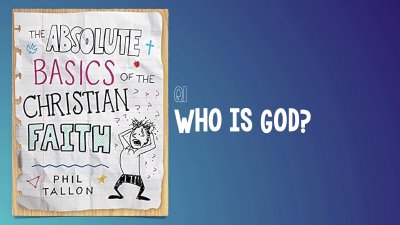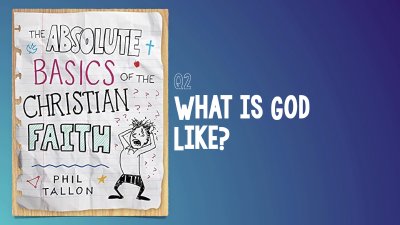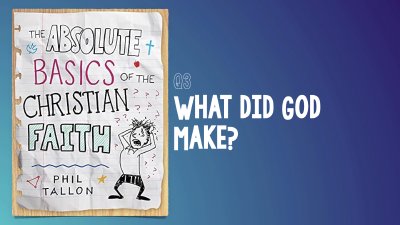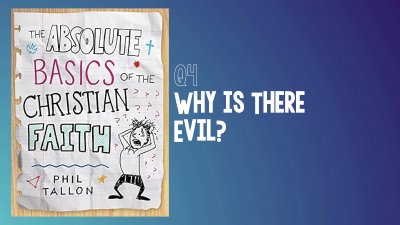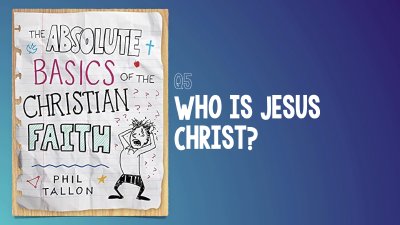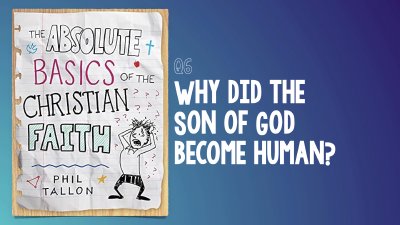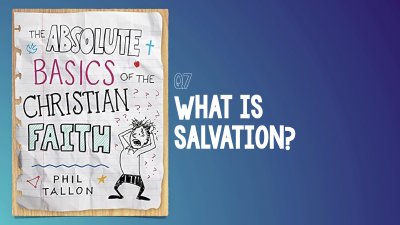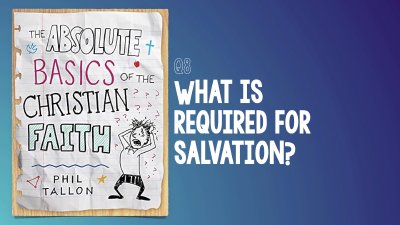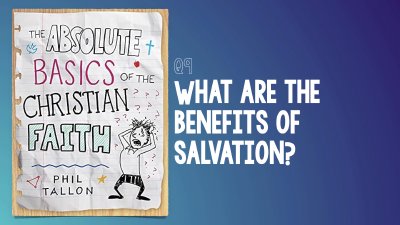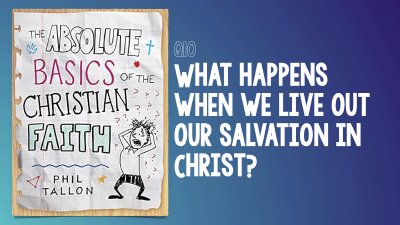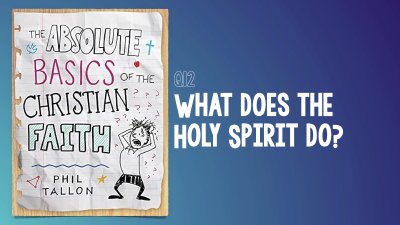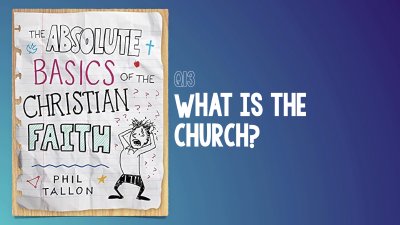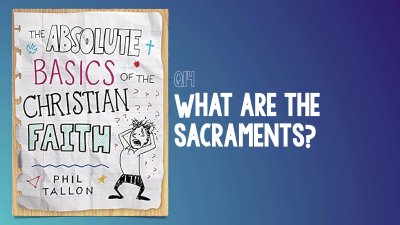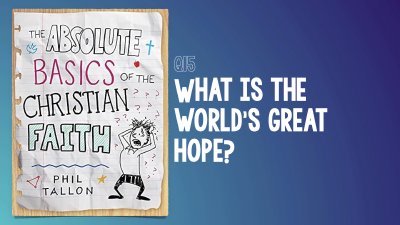

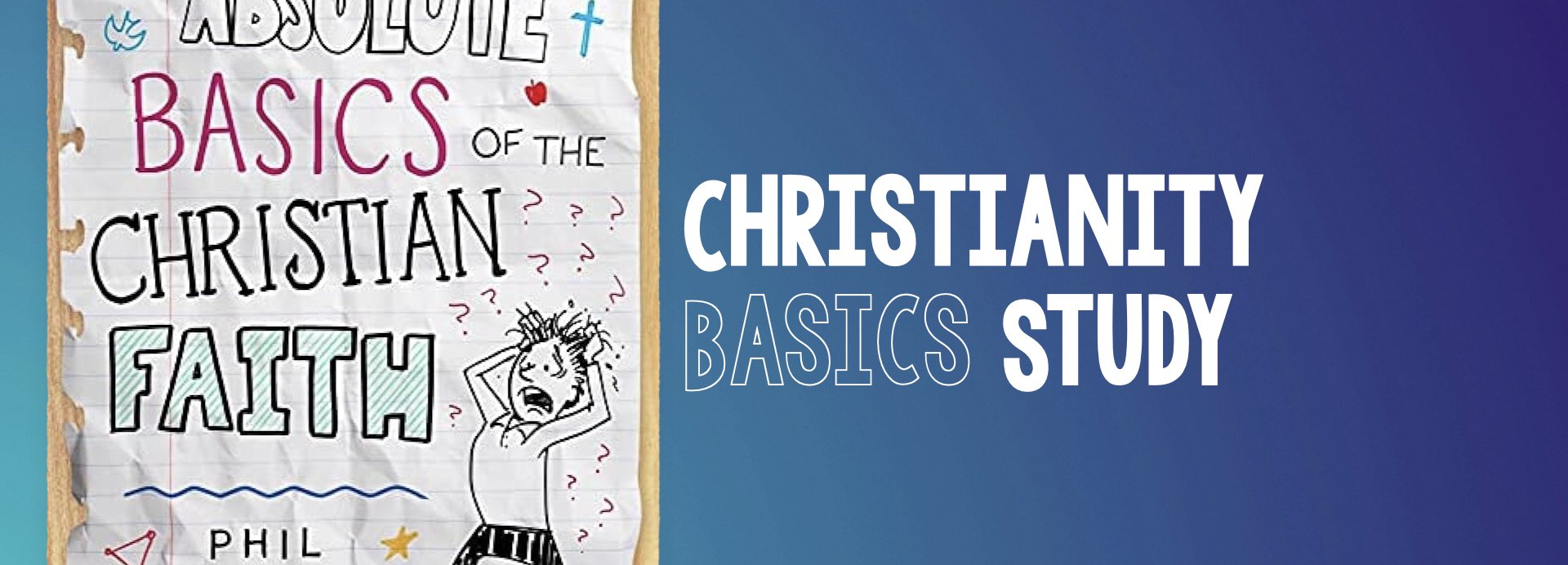
Absolute Basics of the Christian Faith
by Seedbed
Q1 | Who is God?
March 27, 2024 • 2 Corinthians 13:14
Q1. Who is God? A. God is the Holy Trinity: Father, Son, and Holy Spirit. Three persons in one God. (2 Corinthians 13:14) ● Discussion Question: Understanding God as 3-in-1 can be hard. Which way of thinking about God being 3-in-1 made the most sense to you? ● Discussion Question: We heard the analogy of playing 3 notes on a piano that form a chord to help us think about the Trinity. This is a helpful analogy. Can you think of any analogies for the Trinity that you’ve heard that are unhelpful? How are these bad analogies? ● Discussion Question: Look up and read together: 2 Corinthians 13:14 and Titus 3:4–7. How does God work together in our salvation? What does Paul say God, Jesus, and the Spirit are doing? If we pray to the Father in the name of the Son, what is the Holy Spirit up to when we pray? ● Discussion Question: What was the most important idea you learned from this lesson? Is there anything you still don’t understand? ● Application Question: How does a discussion about the Trinity actually impact our lives? How does the fact that God is a Trinity change how we do relationships?
Q2 | What is God Like?
March 27, 2024 • Psalm 147:5
Q2. What is God like? A. God is perfect in power, knowledge, and in His holy love. (Psalm 147:5) ● Discussion Question: You are putting together a team of superheroes. Which of these do you choose: Power Person, Genius Guy, or Moral Man? ● Discussion Question: Look up and read together: Psalm 147:5 and 1 John 4:7–16. Since God is love, what is expected of us? ● Discussion Question: Because God is all-loving, God is merciful. Mercy is when someone does not get what they deserve. How can God execute justice and still be loving and merciful to us? ● Discussion Question: Anselm, in pointing out that God was perfect, went so far as to say that any perfect being (God) must exist, for it is more perfect to exist than not exist. Some have really taken this and run with it and called it the “ontological argument for the existence of God.” Do you think this is a good argument for God? Discussion Question: If God knows everything, does He know the future? Are we free if He does?
Q3 | What did God Make?
March 27, 2024 • Hebrews 11:3
Q3. What did God make? A. God spoke everything into being, by His own free choice, and it was very good. (Hebrews 11:3) ● Discussion Question: Have different people each look up and read Genesis 1:1–5 and John 1:1–5 The Old Testament was written in Hebrew, which has a word, “ruach,” that means spirit, wind, and/or breath. That is the word in Genesis 1 that we read in verse 2. In John, the Greek word for Spirit is “pneuma,” which means spirit, wind, and breath as well. What do these two passages tell us about what the Father, Son, and Holy Spirit are doing in the work of creation? ● Discussion Question: God decide to create out of His own free will. That includes time and space. Why do you think God decided to create the universe? ● Discussion Question: When Christians claim that God created everything, atheists are fond of responding with the question of “who created God?” How do we respond to the question of who created God? Did He create Himself? Or did God just always exist? If something has to always exist, which is more likely to be always existent, God or the universe? ● Discussion Question: God has given us a very good gift by giving us creation, and our natural response is gratitude. What are the ways you normally show gratitude to someone who gives you a good gift? Is it just a feeling in our hearts? How do we show that to God? What is the wrong way to show gratitude? Is there a way that we can be well-meaning and desire to show gratitude but do it in the wrong way? ● Discussion Question: If God is best, then does He always necessarily do what’s best? Does this mean God’s decision to create—and all other decisions—aren’t free? ● Discussion Question: What was the most important idea you learned from this lesson? Is there anything you still don’t understand? ● Application Question: You heard about God bringing life simply through speaking. Do we have the ability to bring life, or take life, through our words? How?
Q4 | Why is There Evil?
March 27, 2024 • Romans 5:12
Q4. Why is there evil? A. God gave us free will to obey and we did not. (Romans 5:12) ● Discussion Question: God put humans in the garden and asked them not to eat the forbidden fruit from the tree. We broke one of God’s only and simple commands. By creating the tree, God gave human beings the possibility to screw up by eating the fruit. Why did He even give us the chance by putting the tree there? ● Discussion Question: There has been a lot of evil as the result of free will. Do you think that free will is worth all of the evil? ● Discussion Question: We often think of evil as a philosophical problem (how can a good and all-powerful God co-exist with evil?) or a historical problem (there are evil events, such as the Holocaust or drunken drivers causing fatal wrecks), but how is it also a personal problem? Would you consider yourself as being a mostly good person or better than other people we would consider “evil”? ● Discussion Question: Would you give up your free will if it meant you always did the right thing? Would you take your friend’s free will it meant that from then on he would always do the right thing? What about that cute-girl-you’ve-been-crushing-on’s free will? ● Discussion Question: Look up and read Romans 5:12. What is the result of sin according to this Scripture? ● Discussion Question: In Isaiah 55:9 God says, “my ways are higher than your ways and my thoughts higher than your thoughts.” Is what’s evil to us good to God? ● Discussion Question: What was the most important idea you learned from this lesson? Is there anything you still don’t understand? Application Question: Part of what it means to be made in the image of God is to represent Him here on earth. How can you represent God in your own life?
Q5 | Who is Jesus Christ?
April 3, 2024 • John 1:14
Q5. Why is Jesus Christ? A. The eternally begotten Son of God and the Son of Mary. Fully divine. Fully human. (John 1:14) ● Discussion Question: Look up and read Romans 3:23 and 6:23, and John 1:14. What is the problem that humanity has before God? Is our problem something we could fix on our own? What is God’s plan to solve our problem? (Why would God do that?) ● Discussion Question: Remember the image of the ladder from the lesson. Look up and read Genesis 28:10–17 (Jacob’s dream) and John 1:43–51 (Jesus calling disciples, notice v.51). Where is God in that picture? Where are we? ● Discussion Question: Jesus is the fulfillment of God’s amazing redemptive plan. As we saw, Jesus Christ was a part of a greater historical plan that includes other covenants with the Jewish people. Why didn’t the Father just send Jesus down right after the fall? ● Discussion Question: God coming to earth is a bit of a plot twist in the grand story of God. As we might expect looking back (and can see for sure in history), it took a lot of people by surprise. Do you think there was any otherway God could have restored the broken relationship? ● Discussion Question: Why is it important that Jesus is both fully man and fully God? ● Discussion Question: Jesus was fully man, sure, but He was also fully God. How are we supposed to relate to Him? Can we relate to Him? ● Discussion Question: What was the most important idea you learned from this lesson? Is there anything you still don’t understand? ● Application Question: Because Jesus is fully human, what does this mean for us, here and now?
Q6 | Why did the Son of God become human?
April 3, 2024 • Galatians 4:4–5
Q. Why did the Son of God become human? A. Because God loves us and wants to make us true children of God. (Galatians 4:4-5) ● Discussion Question: Read together the story of the Prodigal Son from Luke 15:11–32. The video compares the parable of the lost son in Luke 15 to our own story. How do you identify with the characters in the story—the older brother, younger brother, and father? Do you have relationships in which you identify with each of these characters? ● Discussion Question: Look up and read Luke 15:3–10. What is lost in those two stories? How are they found? Who goes looking for them? What do these stories show us about God? ● Discussion Question: The story of redemption is filled with familial imagery: God came to earth to bring us back into the family of God. How do our own human families help us understand (or misunderstand) this image? Does your family show you anything about what God is like? How or how not? ● Discussion Question: Why did God not just forgive us? Couldn’t He have just declared we weren’t guilty anymore? Why did Jesus have to die? ● Discussion Question: The lesson teaches that God’s motivation is love. What other motivations might some people say God has for saving us? ● Discussion Question: How is Jesus’ life like your yours? What do you have in common? How is Jesus’ story different than yours? ● Discussion Question: What was the most important idea you learned from this lesson? Is there anything you still don’t understand? Application Question: What does being a "child of God," mean for your life? How does it change things to continually think of yourself as part of God’s family?
Q7 | What is salvation?
April 3, 2024 • 1 Timothy 2:5–6
Q: What is salvation? A: Through Jesus' sacrificial death and victorious resurrection, we are reconciled with God and rescued from destruction. (1 Timothy 2:5-6) ● Discussion Question: Where do you see disrupted relationship in your own life? ● Discussion Question: What does it mean that death is a consequence for sin? ● Discussion Question: ○ Look up and read Matthew 18:21–27. What problem does the servant have in this passage? What does he ask the master to do for him? What does the master do for him? Who bears the financial cost of rescuing the servant from his debt in this story? Would it be hard or easy for you to forgive a monetary debt that someone owed you? What would make it hard or easy to do so? ○ Continue: Read Matthew 18:28–30. The fellow servant has the same problem the original servant had—he owes a debt he is unable to pay. What is the original servant’s response to his fellow servant’s request for mercy and patience? Who is expected to bear the financial cost of the financial situation in these verses? ● Discussion Question: Look up and read 1 Timothy 2:5–6. The Bible teaches that we have a moral and spiritual debt before God that we cannot repay. Who bears the cost for our situation before God according to these verses? ● Discussion Question: Does Jesus’ death on the cross have power to save people who are a part of other religions? ● Discussion Question: Jesus responded to our disrupted relationship and our prospects for death in two distinct ways: reconciliation and rescue. How do we enact these two remedies in our relationships with family, friends, and people we interact with each day? ● Discussion Question: Jesus’ death made a way for us to be forgiven. But how does the gospel fix us? ● Discussion Question: What was the most important idea you learned from this lesson? Is there anything you still don’t understand? ● Application Question: Have you personally experienced God’s reconciliation through faith in Jesus? If so, when did this first happen? If not, please share where you are right now with God? (This is an important question.)
Q8 | What is required for salvation?
April 3, 2024 • Mark 1:15
Q: What is required for salvation? A: We must repent and believe in Jesus Christ (Mark 1:15) ● Discussion Question: Look up and read Mark 1:15. What does it mean to repent? (To change your mind and behavior.) What does it mean to believe? (To fully trust God.) ○ The lesson used the analogy of a rebellion against a good king by a group of citizens. How do people rebel against God? What makes it hard to surrender to God and God’s ways? What does God want us to do once we have surrendered to Him? (To trust Him and join His side.) ● Discussion Question: Repentance in the Bible means to “change your mind.” In other words, you completely change the way you were living. What happens when we mess up after our repentance? What is the response when we make choices like we did before we “changed our mind”? ● Discussion Question: The Greek word for the word believe in the New Testament implies not just intellectual agreement with an idea, but a level of trust. How can we continue to trust even when we still have some intellectual doubts? ● Discussion Question: The Bible lays out the two things required for salvation: repentance and belief. What are some examples of things some people add to those requirements? How is that addition wrong? What about examples of people subtracting from those requirements, and how is that wrong? ● Discussion Question: What are some actions and habits that reflect a person that has repented and believes? Are these a requirement for salvation? ● Discussion Question: What was the most important idea you learned from this lesson? Is there anything you still don’t understand? Application Question: Is there an area of your life where you think God is calling you to repent, or to trust in Him more fully? (This is an important question.)
Q9 | What are the benefits of salvation?
April 10, 2024 • Romans 5:1
Q: What are the benefits of salvation? A: We are pardoned by God, made part of God's family again, and given resurrection life and power. (Romans 5:1) ● Discussion Opener: Does your family have any specific “house rules” that are different from your friends’ houses? ● Discussion Question: The lesson used an analogy of living in God’s kingdom as being like living in a house. Where do you see yourself in the house analogy right now? ● On the porch: Thinking about repenting and waving the white flag of surrender. ● In the doorway: Believing in Christ but not yet fully living inside the house. ● Inside the house: You have repented and believed, and now you’re learning about life inside God’s house as a member of His family. ● Discussion Question: John Wesley compared living with God to joining Him inside of His house. And like any other home, there are different rules for being in His house. God gives us a new way of living. Unlike some of the rules that our friends give, all of God’s rules have good reasons for them. What are some examples of the new “rules” God gives us and why does He give them? ● Discussion Question: How do we know and understand what “life in the house” looks like? Do we just open up the Bible and follow it verbatim? Or is more reflection required? ● Discussion Question: In the analogy in the lesson, the rebels are given basic necessities as a part of the King’s army. How does God provide for His followers in a similar way? Are there things that God gives to His “army” that He doesn’t give to the other “rebels”? ● Discussion Question: Do some Christians overly focus on the afterlife—the benefits of salvation there? What are the dangers of this? Do some Christians overly focus on the benefits now—the benefits of salvation in this life? What are the dangers of this? ● Discussion Question: What was the most important idea you learned from this lesson? Is there anything you still don’t understand? ● Application Question: Where are you now in your walk with God? What would it mean for you to take the next step into “living in the house” of salvation? (This is an important question.)
Q10 | What happens when we live out our salvation in Christ?
April 10, 2024 • Colossians 1:22
Q: What happens when we live out our salvation in Christ? A: God continues to work in us to make us holy and blameless. (Colossians 1:22) ● Discussion Question: Read Colossians 1:21–22 and Philippians 2:12–13. What is God’s ultimate goal in saving us? What is expected of us in this process? ● Discussion Question: The lesson talks about the differences of justification, regeneration, and sanctification. Reflect on all three of these and point out what someone’s life would look like with one and not the others. Can you have one without the others? ● Discussion Question: If we had trouble being imitators of Jesus before our repentance and believing, how will we be able to be imitators after it? ● Discussion Question: How can we tell that we are being “sanctified” or “being made perfect?” Are there lifestyle changes or actions that we will have? ● How much effort does it take to start a bad habit? To start a good habit? How hard is it to break a bad habit? To break a good habit? Is there a difference between good habits and bad habits? ● What do you think it would feel like to be free from sin? ● Discussion Question: What was the most important idea you learned from this lesson? Is there anything you still don’t understand? Application Question: If you have repented and believed, is there an area of your life where you feel God sanctifying you? Is there some place in your life God is working in you? If not, why not?
Q11 | Who is the Holy Spirit?
April 10, 2024 • John 14:26
Q. Who is the Holy Spirit? A. The eternal Spirit of God, who proceeds from the Father and the Son. (John 14:26) ● Discussion Question: Have various people look up the following verses. When all are ready, read them in turn: Genesis 2:7; Ezekiel 37:1–10; and Romans 8:9–11. What do these passages have in common? How are they different? ● Discussion Question: Jesus, in the Sermon on the Mount, instructs us to pray to “Our Father.” Christians in the early church, as today, often pray to Jesus as God as well. When, if ever, is it appropriate to pray to the Spirit? Why do you think this is such a rare practice today? ● Discussion Question: Christian author and speaker Francis Chan has called the Spirit the “Forgotten God.” Why do you think that is and how does that reflect who the Spirit is and what the Spirit does? ● Discussion Question: Have you ever had a personal experience with the Spirit of God in a way that you feel is different than an experience with the Father or Son? ● Discussion Question: What was the most important idea you learned from this lesson? Is there anything you still don’t understand? ● Application Question: How do we discern if the movement within ourselves is the Spirit of God or whether it is our own thoughts . . . or yesterday’s lunch?
Q12 | What does the Holy Spirit do?
April 10, 2024 • Titus 3:5–6
Q. What does the Holy Spirit do? A. The Spirit leads us to repentance, gives us new life, and empowers us to follow Jesus. (Titus 3:5-6) ● Discussion Question: How is the Spirit involved in our own salvation? ● Discussion Question: In an earlier lesson, we heard that the phrase “the Gospel is bad news before it is good news.” How does this apply to the work of the Holy Spirit? ● Discussion Question: Look up and read Acts 2:1–5, 12–18. How did God make the disciples witnesses to the people gathered in Jerusalem? How does God call us to be witnesses in our school, community, and church? ● Discussion Question: Look up and read Galatians 5:16–17, 22–25. What elements or ingredients are needed in order to grow fruit? When you think about your life growing the character-fruit God wants, what is the seed? the soil? the water? the sunshine? Where is the Holy Spirit in this? ● Discussion Question: Look up and read John 20:21–23. What job does Jesus give the disciples? How can that job be challenging or difficult? How does the Holy Spirit help us live out that responsibility? ● Discussion Question: If we receive the Spirit upon our salvation, does that mean the Spirit is absent in people who aren’t Christians? ● Discussion Question: If we are Christians who are being changed and led by the Spirit of God, the Spirit is in some sense working in our thoughts and actions. What is the process by which the Spirit works in our minds and thoughts? If we have a thought, what percentage of it is Spirit working in us vs. our own free thinking? How is this increased or decreased? ● Discussion Question: What was the most important idea you learned from this lesson? Is there anything you still don’t understand? Application Question: Is there any area of your life where you feel a need for the Spirit’s power to help you?
Q13 | What is the church?
April 17, 2024 • Ephesians 4:4–5
Q. What is the church? A. The church is the community of all true believers, who are Christ's body in the world, continuing the work of the apostles. (Ephesians 4:4-5) ● Discussion Question: In comparing the church to the body, which body part would you be? Are you an ear (do you listen well)? Are you an eye (do you observe needs around you)? ● Discussion Question: Eugene Peterson said that churches are not parlor rooms for saints, but “messy family rooms.” What do you think he means by this? How does this critique or encourage your own church family? ● Discussion Question: Some are fond of saying that they want to be Christians and love Jesus, but don’t need church. Why is the church important? Is the church required for salvation? ● Discussion Question: What does the theology of the church teach us about how to pick a church? If we move to a new city, what is the best way to process becoming a part of a local church? ● Discussion Question: What is Jesus doing through the church today? ● Discussion Question: The lesson talked about two kinds of people: those who like the body (the church) but not obeying the head (Jesus); and those who like obeying the head (Jesus), but not being a part of the body (the church)? Are you ever like either of these kinds of people? ● Discussion Question: How does being a part of a local church affect our own Christian walk? ● Discussion Question: What was the most important idea you learned from this lesson? Is there anything you still don’t understand? ● Application Question: How can you be an effective part of your church now?
Q14 | What are the sacraments?
April 17, 2024 • Matthew 28:19–20
Q. What are the sacraments? A. Baptism is the holy covenant by which we join the church, and Holy Communion is the church's ongoing act of thanksgiving. Both are means of participating in Jesus' death and resurrection. (Matthew 28:19-20) ● Discussion Question: Dallas Willard said (roughly), discipleship is becoming who Jesus would be if He were you. How is your imitation of Jesus different than other people you know? How is it the same? ● Discussion Question: Read Matthew 28:19–20 together. What does Jesus tell us about what it means to be a disciple here? ● Discussion Question: The lesson pointed out two sacraments, or sacred actions, of the church: baptism and communion. Are there other ways God offers us grace besides these? How are they similar to baptism and communion? How are they different? ● Discussion Question: The two sacraments come at the beginning and end of Jesus’s ministry. Is this significant? ● Discussion Question: Baptism and communion have a unique place in Christian history. They have been the subject of much debate, but all orthodox Christian communities recognize their importance. What effect do they have on the life of an individual Christian believer? ● Discussion Question: Have you been baptized? If so, talk about when it was. Were you a baby? If you haven’t been baptized, talk about that. Do you have plans to be baptized? ● Discussion Question: Theologian Peter Kreeft said of communion: “Christ did not say ‘take and understand’ he said ‘take and eat.’” How much ought we to understand about the spiritual effect of the sacraments and how important is our understanding? ● Discussion Question: What was the most important idea you learned from this lesson? Is there anything you still don’t understand? Application Question: Discipleship isn’t just a me-and-Jesus thing. It involves other, more mature people teaching and guiding us. How are you being discipled right now?
Q15 | What is the world’s great hope?
April 17, 2024 • Revelation 22:20
Q. What is the world’s great hope? A. Christ has died. Christ has risen. Christ will come again to redeem all things and reign as King forever. (Revelation 22:20) ● Discussion Question: What is your favorite part of the Bible? Is it the ending? ● Discussion Question: What are some different reasons we read the Bible? Is there one main reason? Or are there many reasons we should read the Bible? ● Discussion: Read Matthew 6:9–13 together. What does the part in the Lord’s prayer, where we say, “thy kingdom come,” mean for life on earth now? How is it connected to all the other parts of the prayer? ● Discussion Question: Why is the story of God, as told in the Old and New Testaments, important for knowing what the future holds? ● Discussion Question: What do God’s past acts of redemption tell us about the future act of redemption? ● Discussion Question: J.R.R. Tolkien and C.S. Lewis have both written extensively on how great stories and pieces of fiction actually reflect the great story of God, many of them including signposts toward the great truth about reality, that all will be made right in the end. What stories—think of nursery rhymes, books, movies, and even music—can you think of that reflect this truth? ● Discussion Question: Should the Christian pray for Christ’s second coming? Or should the Christian pray for more time to reach more people? Should the Christian desire death—union with Christ; or life—opportunity to work as Christ? ● Discussion Question: What was the most important idea you learned from this lesson? Is there anything you still don’t understand? ● Application Question: How does knowing that Jesus is returning to redeem all things change how we live here and now?


